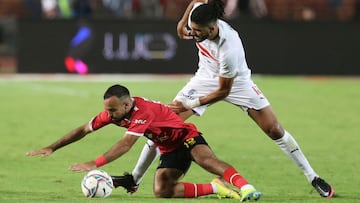'African clubs need to develop their brand before chasing profit'
On the penultimate day of WFS live and 24 hours before the CAF Champions League final, a panel of experts debated: How can African clubs & leagues better promote themselves to be more commercially viable?


With the final of the 2020 CAF Champions League final taking place in just over 24 hours in an all Egyptian clash between the two Cairo based giants Al Ahly and Zamalek, it was fitting that one of the key discussions on the penultimate day of WFS Live focused on the African game.
A panel of experts covering broadcast, football management and three club representatives (Egypt's Al Ahly, Moroccan giants Raja Casablanca and Uganda's SC Villa) looked at series of ways in which both African clubs and leagues could better promote themselves for broader reach, increased popularity and maximise commercial gain.

Huge disparity between clubs
Hicham El Amrani former Secretary General of the Confederation of African football (2010-2017) opened the round table discussion observing that from a recent FIFA professional report, there are about 830 clubs in African leagues and of which 600 are run in a professional capacity on the continent but we regularly only see 20 of these clubs regularly features in the CAF the Champions League and the Confederations Cup.
He focused on the lack of a level playing field in the African club system with the likes of Cairo giants Al Ahly boasting a combined Twitter audience of more than 10 million followers across their Arabic, English and Twitter accounts.
Welcome to the African Club of the Century 🦅👑#BeckahmIsBack pic.twitter.com/VKdhg3His9
— Al Ahly SC 🇬🇧 (@AlAhlyEnglish) November 23, 2020
Related stories
Khaled Mortagy board member at Cairo's Al Ahly SC analysed the way the club has tapped into it's heritage as being not just Egypt's most successful and hugely supported club but in ways the Cairo outfit are trying to reach new supporters outside the traditional areas on Northern African and other Arabic countries. Mortahy pointed to the recent hiring of South African coach Pitso Mosimane who moved to Cairo this summer after a successful with Mamelodi Sundowns and how interest in the club has rocketed not just in South African bit in many other parts of the Sub-Saharan continent.
Education key in many nations
Shawn Mubiru CEO at SC Villa Uganda focused on the importance internally at many African clubs. "It's going to take a lot of education in terms of getting the business community to understand that football is also a business, and it can be also treated as an attractive product by sponsors. For me, the reason why Uganda and other leagues in East Africa are lagging behind, comes down to organisation. It's all about, clubs, understanding that they must run themselves. It's all about getting the right experts to do the right jobs. African clubs need to develop their brand before chasing profit".
@ShawnMubiru
— ITB Strategies (@itbstrategies) November 26, 2020
"Football in East Africa lags behind because of disorganization. We have to build organizations that are well governed, accountable and transparent."@SCVillaJogoo you have the right man at the helm. ✅✅✅@WFSummit #WFSLive pic.twitter.com/gjx2HD3jRQ